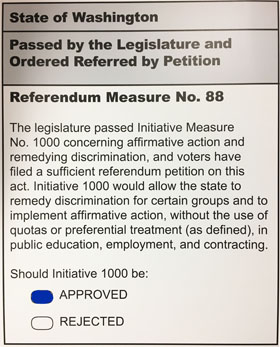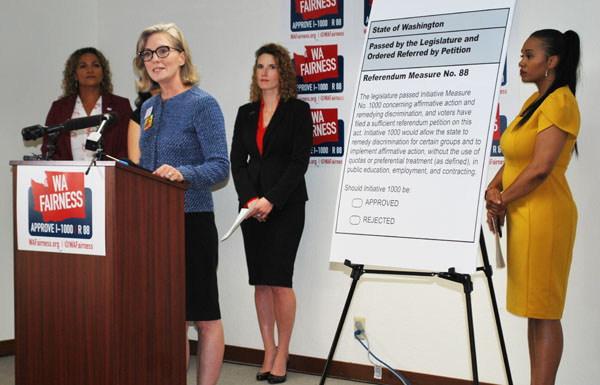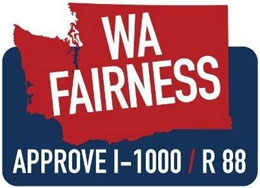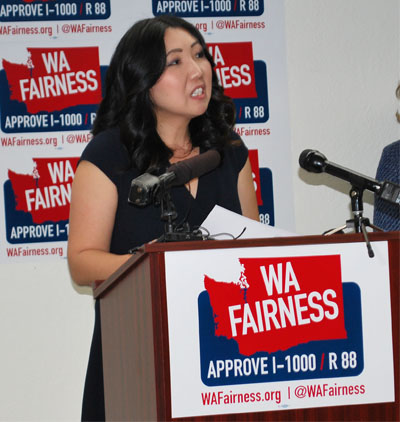ELECTION
WA Fairness explains why voters should approve I-1000 / R88
 SEATTLE (Sept. 13, 2019) — The WA Fairness campaign, representing a broad coalition of hundreds of community organizations, unions and businesses in support of Initiative 1000/Referendum 88, formally launched its efforts at a press conference Thursday. The group urged Washington voters to “look for Referendum 88 and approve I-1000” on November’s ballot.
SEATTLE (Sept. 13, 2019) — The WA Fairness campaign, representing a broad coalition of hundreds of community organizations, unions and businesses in support of Initiative 1000/Referendum 88, formally launched its efforts at a press conference Thursday. The group urged Washington voters to “look for Referendum 88 and approve I-1000” on November’s ballot.
Multiple speakers explained why I-1000 would restore opportunities for women, veterans, small businesses, and people of color in government contracting and employment, and provide a level playing field for all Washingtonians in public university applications.
“This has been a priority for the Washington State Labor Council and our state’s labor movement for years,” said April Sims, Secretary Treasurer of the Washington State Labor Council, AFL-CIO. “Our coalition is committed to restoring fairness and opportunity in Washington state by asking voters to approve I-1000.”
Last year, nearly 400,000 voters petitioned lawmakers to support I-1000 to restore fairness and opportunity to Washington’s public employment, contracting, and education enrollment policies. Under I-1000, quotas and preferential treatment would remain prohibited, but it would allow outreach and recruitment of veterans, women, minorities and others who are too often left behind in government hiring, contracting and education. The Washington State Legislature passed I-1000, but now voters must also approve it.
Hyeok Kim, former Deputy Mayor of the City of Seattle (pictured at left), emceed Thursday’s press conference and introduced Daniella Young, a veteran and military spouse. She said that veterans face unique challenges re-entering the workforce after serving our country and I-1000 would provide more opportunities for them.
“As a state, we have an obligation to do everything we can to help our veterans once they come home,” Young said. “I-1000 will do a lot. It will open more points of entry for veterans in family-wage jobs, in government agencies, help them be successful in university admission processes, and open more opportunities for success in bids for public contracting.”
Kristin Rowe-Finkbeiner, Executive Director and CEO of Mom Rising, noted that since the I-200 ban took effect, the number of state contracts awarded to women and minority-owned businesses has declined from an average of 10 percent in 1998 to down to about 3 percent today. She called that “outrageous.”

(From left) April Sims, Kristin Rowe-Finkbeiner, Danielle Hall, and Washington Fairness Communications Director KD Hall at the Sept 12 press conference.
“It’s time to act,” Rowe-Finkbeiner said. “Washington state is one of only eight states — eight in the entire nation — that prohibits the use of public resources to help women and people of color find and retain good jobs that pay good wages and allow us to support our families, to open our own businesses, and to have equitable and equal access to opportunities. One of only eight. We need to change that.
“We know we can do better in Washington,” she added. “And the good news is, we have an opportunity to make a difference in November. By voting to approve I-1000, we’ll make sure every daughter can earn just as much as every son, which benefits each and every one of us in the long run.”
“Initiative 1000 simply allows outreach, recruitment, and training opportunities to women, veterans, and small businesses consistent with laws in 42 other U.S. states,” said KD Hall, communications director for WA Fairness. “Small businesses need a level playing field to compete, and opportunities to engage in public contracting. These are the common-sense goals of I-1000, which does not make use of caps or quotas to determine outcomes. It’s important we continue making progress for fairness in Washington state.”
 For more information about WA Fairness, visit WAfairness.org and follow its Facebook page.
For more information about WA Fairness, visit WAfairness.org and follow its Facebook page.
PREVIOUSLY at The Stand:






